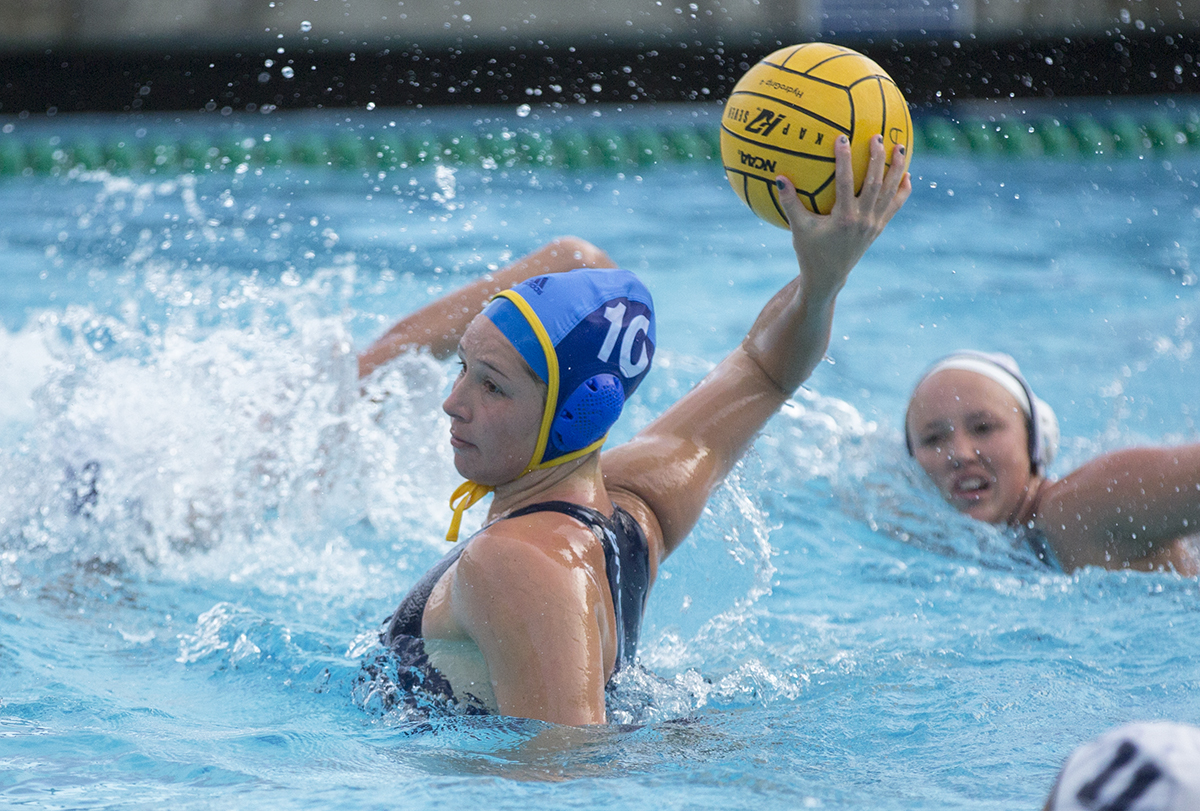Women’s water polo looks to improve late game offense

Freshman utility Mackenzie Barr said that maintaining focus for the entire match is one challenge the UCLA women’s water polo team needs to address after the offense has stalled at times late in games.
(Austin Yu/Daily Bruin)
By Erik Rehnberg
April 3, 2014 1:10 a.m.
With only a couple weeks left in the regular season, the UCLA women’s water polo team has come a long way from the start of the season. Tied for the top slot in the Mountain Pacific Sports Federation as well as nationally, coach Brandon Brooks and the Bruins (20-2, 2-0 MPSF) don’t have much to complain about.
In the pool, however, the story is a bit different. The team got off to two slow starts over spring break, nearly costing it a road win against Cal. In their last game against Hawai’i, the Bruins were unable to score in the fourth period, highlighting a problem the team has had all year: fading toward the end of games.
While UCLA scored 81 goals in the first quarters of its first 22 games, it only scored 49 times in the fourth quarters. While some of that has to do with most, if not all, of UCLA’s starters coming out in the fourth quarter of some blowout games, it may also be due to what challenges the team has had staying focused on the game at hand.
After the team’s close win against Cal, Brooks said that the team started to “watch into the clock a little bit,” counting down the time to the end of the game instead of trying to extend UCLA’s lead.
The team has struggled with that all season. Before the Stanford Invitational in February, freshman utility Mackenzie Barr said “staying 100% on the game all four quarters” was one of the team’s biggest challenges going into the weekend. In that tournament, Cal closed UCLA’s lead late in the third quarter, forcing the Bruins to eek out an overtime victory. After the tournament, Barr said that a lack of aggression in the tournament contributed to Cal’s comeback as well as UCLA’s subsequent loss to Stanford.
Lately, UCLA’s problems have come at the beginning of its games. Harvard kept the game tied until halfway through the first period, and the Bruins didn’t begin to pull away from the Crimson until late in the first. Against Cal last Thursday, UCLA trailed in the first period, only to come back in the second and hold on for the second half.
“At the root of it, we’re still a fairly young team,” Brooks said of the team’s problems.
The team still is young. While the team’s top scorer is a junior, three of the top five scorers are freshmen or sophomores. In the net, backup goalie Alex Musselman, who has played, on average, just under a quarter per game, is a sophomore.
While age may have something to do with it, most of UCLA’s younger players have played at the international level for various US and Canadian youth and junior national teams. Team cohesion may be an issue as well with a young team, but redshirt junior goalkeeper Sami Hill described the Bruins as “more of a team than (they) have been in the past” earlier this season.
Whatever the root of UCLA’s issues, the Bruins have still been able to perform. The team avenged its loss to No. 1 Stanford at the Stanford Invitational with a win against the Cardinal at the UC Irvine Invitational three weeks later, and only two last-minute goals from USC pushed the Trojans over the Bruins in the last game of the UCI tournament.
The Bruins play again at unranked CSU Bakersfield on Saturday, before returning home next weekend to play Stanford and No. 8 San Jose State.


